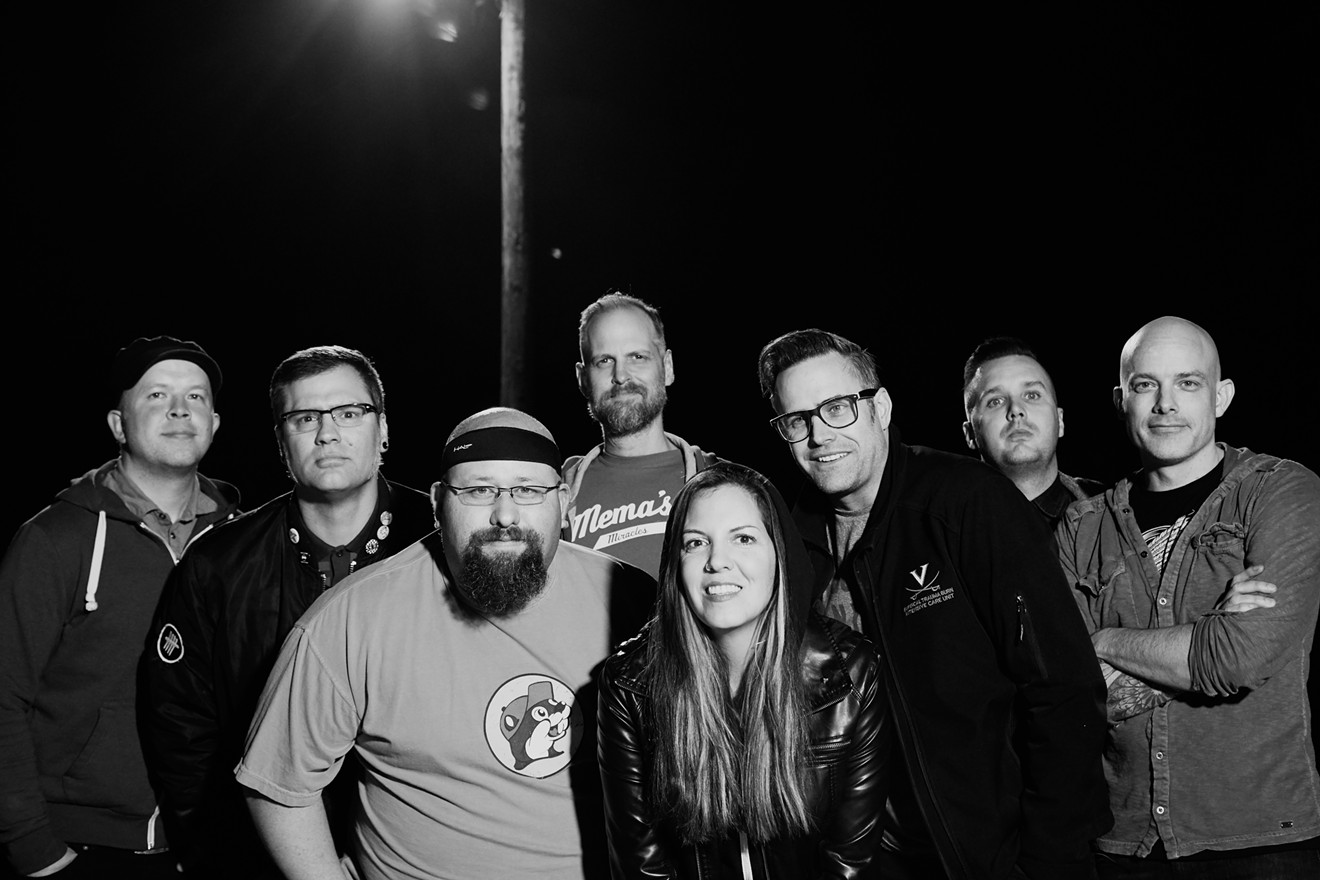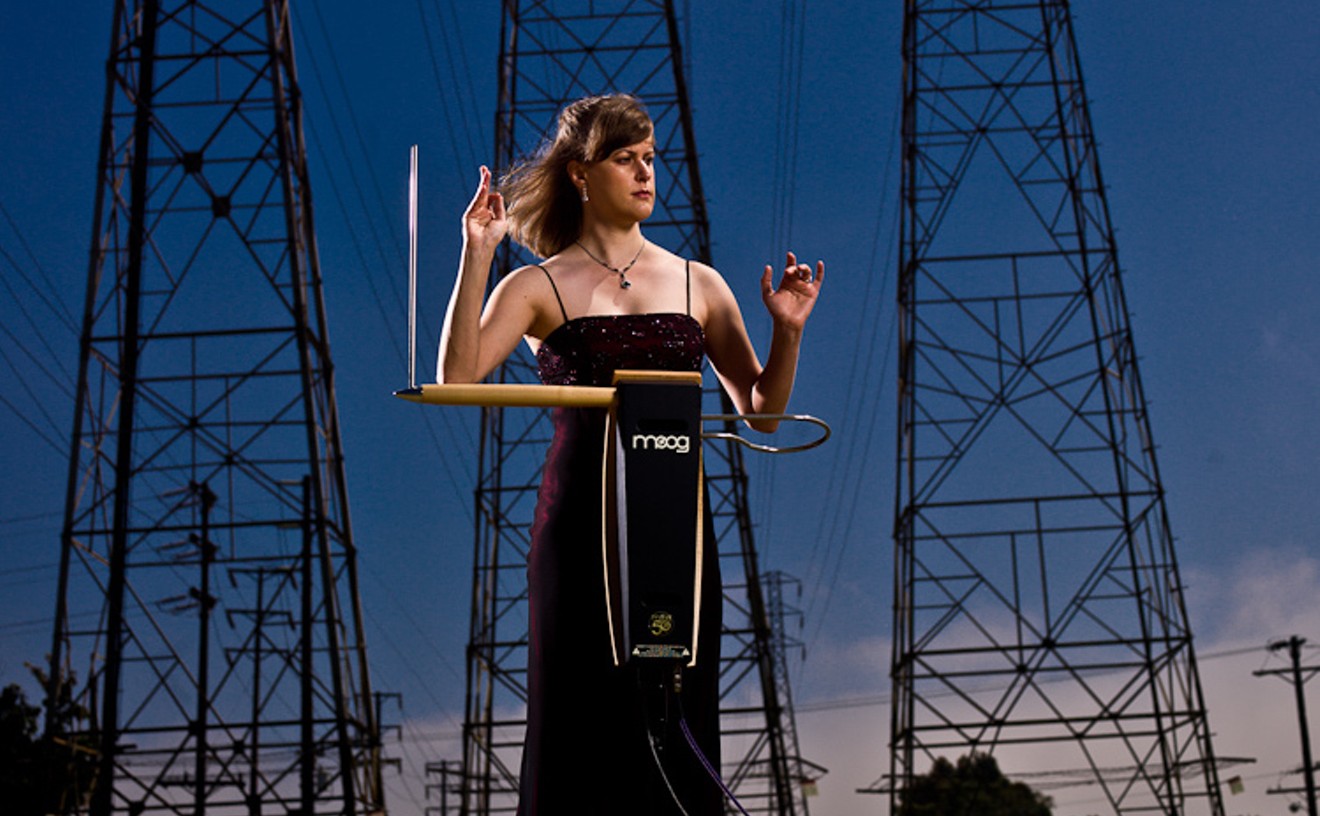Seven years have passed since Five Iron Frenzy, Denver’s preeminent Christian ska band, dropped an album. But now, thanks to a muscular Kickstarter campaign, the bandmates have most of what will be called Until This Shakes Apart in the can. The new record addresses immigration, gun laws, the current presidential administration and the general state of society.
“We’ve always been down to talk about that stuff,” says tenor saxophonist Leanor Ortega Till. “We’re not going to stop now. It’s one of those interesting times in history where you kind of have to pick a side in some ways. You can’t just be in the middle. There’s no middle.”
Ortega Till says times are strange for Five Iron Frenzy. Most of the band’s members, though not all, are Christians, and they are formally a Christian outfit. But they don’t vibe with the Christian nationalism that is surging through the United States right now. A song off the new record, “While Supplies Last,” tackles the notion of calling yourself a Christian while mistreating others.
But while some songs address controversial issues, the band never forgets to have a good time. For example, the video for “Zen and the Art of Xenophobia” includes a machine-gun-blasting Jesus Christ and Abraham Lincoln rocking Wolverine claws. Ortega Till finds the notion that Jesus is somehow pro-American to be absurd and small-minded.
“When we look at the words of Jesus, we feel that he’s very much saying ‘Love the immigrant. Love your neighbor, no matter what race,’” she says. “Jesus never said ‘Go, America!’”
Ortega-Till believes that the current presidential administration has politicized the idea of Christian nationalism to appeal to a segment of the evangelical community — though she’s quick to add that not all evangelical Christians buy into it. But even the word “evangelical” has been sullied by politics and now carries a negative connotation for many.
“We can’t even use that language anymore,” she points out. “'Evangelical' just used to mean to talk about God. It’s like you can’t even use the word anymore. It's been so warped that it’s not a safe word anymore.”
Still, she's not ready to throw the baby out with the bathwater: “That doesn’t mean if you’ve had a bad experience or if you have found love or enjoy your spirituality that you're going to just get rid of it because some people are giving it a bad name.”
Five Iron Frenzy started in 1995, broke up in 2003 and reunited in 2011. Aaron Carnes, music editor at Santa Cruz alt-weekly Good Times and author of the upcoming book In Defense of Ska, says that the band is one of the biggest ska outfits to emerge from Denver. In his view, Five Iron Frenzy straddled the line between the Christian and secular worlds and drew in a lot of "oddball" Christian kids who didn't quite fit into the well-oiled Christian music scene.
Carnes notes that while the band plays fun music, it often tackles serious issues as well, such as racism, school shootings and homophobia in the church.
"They were brave enough to champion progressive causes and do things like play the Ska Against Racism tour when most Christian bands wouldn’t," he says of the group's early years. "They did their own thing, and a lot of kids really related to them.
"A lot of Christian artists at the time, politically, were aligned with American conservatism," he recalls. "That’s still true. Five Iron Frenzy was never part of that, and I admire them for not conforming, and to continually be truth seekers. I also admire that they continue to mature and evolve."
As an example of that evolution, Carnes offers the 2000 song "Fahrenheit." The song condemns homophobia but still refers to homosexuality as a sin. Singer Reese Roper later re-evaluated his position and put out a statement saying he was wrong to refer to homosexuality as a sin. The band also recently caught flak from some of its Christian fans for supporting the Black Lives Matter movement.
Carnes says that within the Christian ska scene, Five Iron Frenzy is hands-down the best and most important band; while some Christian ska bands aped popular styles in the ’90s in order to get their message out, Five Iron always forged its own path.
"They were very unique and very sincere in what they created as artists," he says. "Five Iron Frenzy paved the way for Christian ska to be taken more seriously within the larger ska scene. That didn’t happen with other genres. Five Iron Frenzy was willing to get out there and play to non-Christian audiences — many of whom were skeptical but who quickly became fans."
Aside from one member leaving, Five Iron's lineup has been the same since 1995 — quite a feat for a band with eight members. Ortega Till likens the bandmembers to a family: Sometimes they fight, but they work through things and always respect one another.
“We don’t all have the same beliefs,” she says. “We don’t all have the same political views. Not all of us are Christians. We are all different; we're all over the place. You have to make it work, and respect has to come, number one. Respect and compromise are huge in being in an eight-person ska band.”
Five Iron’s members — Dennis Culp, Sonnie Johnston, Andrew Verdecchio, Micah Ortega, chief lyricist Roper, Brad Dunham, Scott Kerr and Ortega Till — are all in their forties and fifties, have families and hold down regular jobs, so they don't tour as much as they used to. Ortega Till says the band sometimes goes on what she calls “fly-outs,” to do one or two shows on a weekend.
But while the days of long tours are gone, the band hasn’t lost its healthy following. The bandmates set up a Kickstarter campaign to raise funds for Until This Shakes Apart and raised way more than they initially asked for — a lot more. Ortega Till says the money they raised will cover the album, and that they should also be able to record and release extra music and produce videos to go with the new songs. (According to Carnes, the band previously raised $207,000 for 2003's Engine of a Million Pilots.)
Five Iron Frenzy still records and plays some throwback ska, and members say they always felt at home in the ska scene, which was inclusive and welcoming. These days, though, the band’s sound often veers away from its well-known ’90s ska-revival style. Ortega Till describes the newer music as “rock with horns.”
“We have elements of NOFX, elements of Jimmy Eat World and Weezer,” she notes. “We have elements of Operation Ivy. So there’s a lot of punk. There’s also a lot of rock influence, a lot of Oingo Boingo. It’s kind of all over the place.”
The group hasn’t hit the stage since January, when it played a couple of shows with MxPx in Florida and Georgia, but its members have kept themselves occupied recording the new album.
“The recording has been cool because we're recording during a pandemic,” Ortega Till says. “There’s nothing else you can do, so it’s nice to have this to distract us.”
Look for Until This Shakes Apart in late 2020 or early 2021. “So We Sing,” the record's first single, is available now on Spotify. Learn more at fiveironfrenzy.com.
[
{
"name": "Air - MediumRectangle - Inline Content - Mobile Display Size",
"component": "12017618",
"insertPoint": "2",
"requiredCountToDisplay": "2"
},{
"name": "Editor Picks",
"component": "17242653",
"insertPoint": "4",
"requiredCountToDisplay": "1"
},{
"name": "Inline Links",
"component": "18838239",
"insertPoint": "8th",
"startingPoint": 8,
"requiredCountToDisplay": "7",
"maxInsertions": 25
},{
"name": "Air - MediumRectangle - Combo - Inline Content",
"component": "17261320",
"insertPoint": "8th",
"startingPoint": 8,
"requiredCountToDisplay": "7",
"maxInsertions": 25
},{
"name": "Inline Links",
"component": "18838239",
"insertPoint": "8th",
"startingPoint": 12,
"requiredCountToDisplay": "11",
"maxInsertions": 25
},{
"name": "Air - Leaderboard Tower - Combo - Inline Content",
"component": "17261321",
"insertPoint": "8th",
"startingPoint": 12,
"requiredCountToDisplay": "11",
"maxInsertions": 25
}
]











